1. Early Life and Education
James Conley Justice II was born on April 27, 1951, in Charleston, West Virginia, to James Conley Justice and Edna Ruth (née Perry) Justice. He grew up in Raleigh County, West Virginia, and his formative years shaped his future in both business and public service.
1.1. Childhood and Education
Justice attended Woodrow Wilson High School in Beckley, graduating in 1969. He initially enrolled at the University of Tennessee on an athletic scholarship for golf, showcasing his early athletic talent. He later transferred to Marshall University, where he continued his collegiate golf career, serving as a two-year captain for the Thundering Herd golf team. He earned both his bachelor's degree and a Master of Business Administration from Marshall University.
2. Business Career
After completing his education, Justice entered the family's agriculture business, laying the groundwork for his extensive and often controversial business empire that would span multiple sectors.
2.1. Agricultural and Coal Business
In 1977, Justice founded Bluestone Farms, which grew to operate 50 K acre (50.00 K acre) of farmland and became a leading producer of grain on the East Coast of the United States. He was a seven-time national corn growing champion. During this period, he also developed Stoney Brook Plantation, a 15 K acre (15.00 K acre) hunting and fishing preserve in Monroe County.
Upon his father's death in 1993, Justice inherited ownership of Bluestone Industries and Bluestone Coal Corporation. In 2009, he sold a portion of his coal business to the Russian company Mechel for 568.00 M USD. However, a significant drop in coal prices led Mechel to close some mines, prompting Justice to repurchase the business in 2015 for only 5.00 M USD. Following the buy-back, Justice reopened several of the mines, leading to the rehiring of over 200 miners. As of 2014, his holdings included 70 active mines across five states.
2.2. The Greenbrier Resort and Other Ventures
Justice expanded his business interests into the hospitality sector in 2009 when he acquired The Greenbrier, a luxury resort and National Historic Landmark in White Sulphur Springs, for 20.50 M USD. This acquisition famously prevented the resort from going into bankruptcy. Justice also owned or managed over 50 other companies.
His charitable activities, often linked to his businesses, include a 25.00 M USD donation for the James C. Justice National Scout Camp at Summit Bechtel Reserve, 5.00 M USD to Marshall University, and 10.00 M USD to the Cleveland Clinic. He also annually donates over 1.00 M USD in Christmas gifts through the "Dream Tree for Kids" program. Before taking office as governor, Justice resigned from all executive positions in his businesses, placing his daughter Jill in charge of The Greenbrier and his son Jay in charge of his mining and agriculture businesses. He stated his intention to place all his assets in a blind trust, though this process was described as complex and time-consuming.
2.3. Financial Status and Business Controversies
Justice's financial standing has seen significant fluctuations, and his business practices have attracted considerable controversy and scrutiny. Once estimated to be worth 1.90 B USD in 2018 (according to Forbes) and 1.60 B USD in 2014, his net worth declined to 513.30 M USD by October 2021. By January 2025, Forbes reported that his net worth had fallen to below zero due to having over 1.00 B USD in debt, indicating a dramatic financial downturn for the former billionaire.
His mining companies have faced numerous allegations of safety violations and unpaid taxes. In 2016, NPR labeled him the nation's "top mine safety delinquent," reporting that he allegedly owed millions of dollars in back taxes and unpaid coal mining fees and fines across six states, covering property, mineral, state severance, and withholding taxes, as well as federal income and unemployment taxes, and mine safety issues. In 2019, two debt-related lawsuits were settled. By 2020, mining companies owned by Justice or his family agreed to pay 5.00 M USD in delinquent safety fines. A 2020 investigation by ProPublica further revealed that Justice had paid more than 128.00 M USD in judgments and settlements for his businesses' unpaid bills. In October 2023, a federal court ordered the U.S. Marshals Service to seize and sell a helicopter owned by his company to satisfy an 8.00 M USD judgment granted to a creditor.
During the COVID-19 pandemic in 2020, Justice and his family's businesses received between 11.00 M USD and 24.00 M USD in aid through the Paycheck Protection Program. His luxury resort, The Greenbrier Hotel Corporation, specifically received a loan of between 5.00 M USD and 10.00 M USD. This particular loan was notable as the company did not commit to retaining any jobs in exchange for the funds, which the Greenbrier would only have to repay if less than 60% of the funds were used for payroll, raising questions about the social impact and accountability of such aid.
3. Political Career
Jim Justice's political career is marked by his initial entry into state politics as a Democrat, his highly publicized party switch, and his subsequent rise to the United States Senate.
3.1. Governor of West Virginia
Justice's tenure as Governor of West Virginia from 2017 to 2025 was defined by his distinctive leadership style and a notable shift in political affiliation.
3.1.1. Gubernatorial Elections

In 2015, Justice declared his candidacy for Governor of West Virginia in the 2016 West Virginia gubernatorial election. Notably, he ran as a member of the Democratic Party, despite having been a registered Republican until February 2015. This election marked his first foray into political office. He secured the Democratic nomination in May 2016 and went on to defeat Republican nominee Bill Cole in the November general election, winning with 49.09% of the vote. He received strong support from the United Mine Workers.
In January 2019, Justice announced his bid for re-election in the 2020 West Virginia gubernatorial election. This time, he ran as a Republican, having changed his party registration after a high-profile rally with President Donald Trump in 2017. He defeated multiple challengers in the Republican primary. His general election campaign focused on his administration's response to the COVID-19 pandemic, the state's budget surplus, and efforts to address the substance abuse crisis. On November 3, 2020, he defeated Democratic challenger Ben Salango with over 63% of the vote. This victory made him the first Republican gubernatorial candidate to win re-election in West Virginia since Cecil H. Underwood in 1996, and the first Republican incumbent to secure a second term since Arch A. Moore Jr. in 1972. While the United Mine Workers had endorsed Salango in 2020, Justice received the endorsement of the West Virginia Coal Association, which lauded his efforts to protect miners, increase coal production, and explore innovative uses for coal that could lead to new job opportunities.
3.1.2. Governorship Tenure
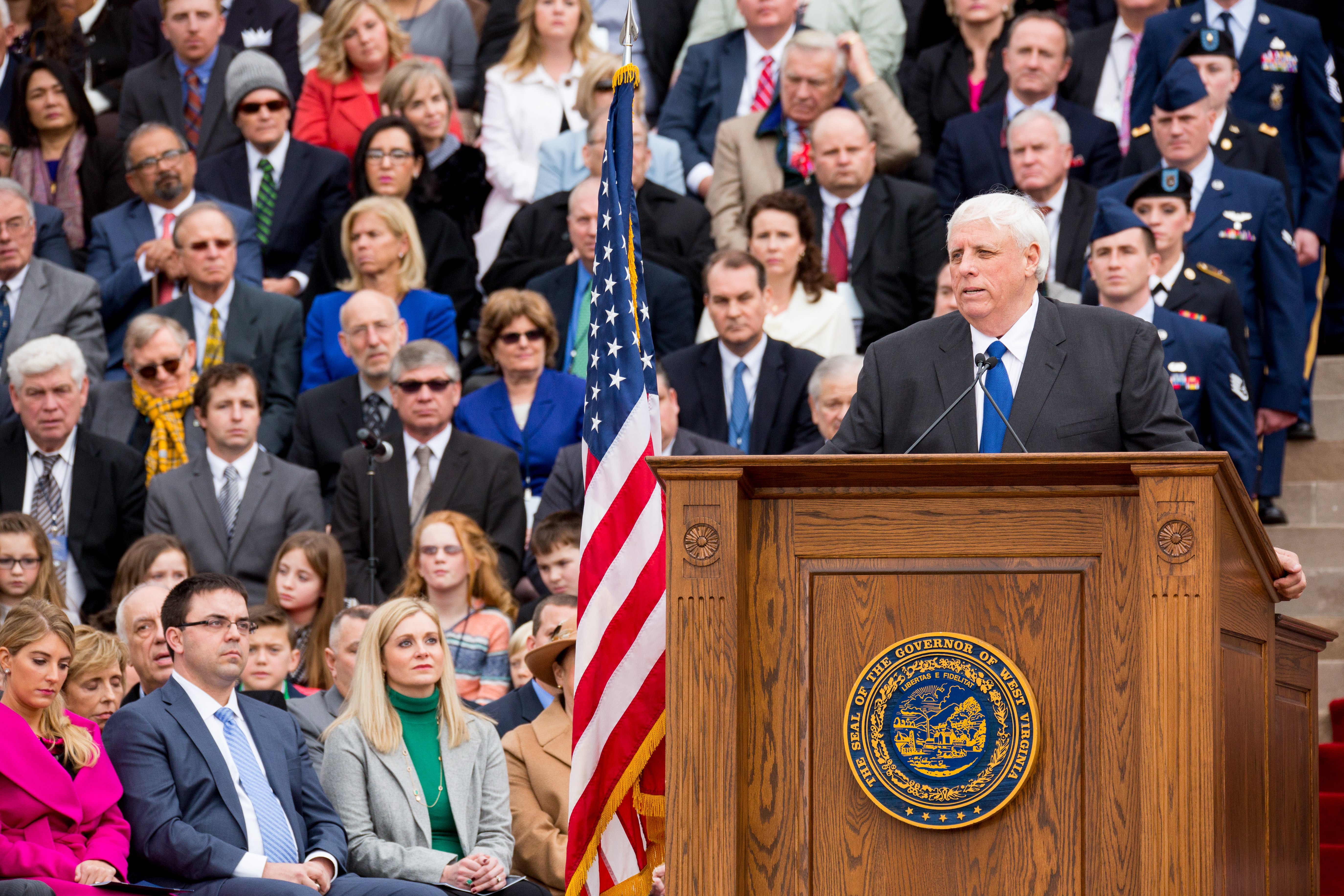
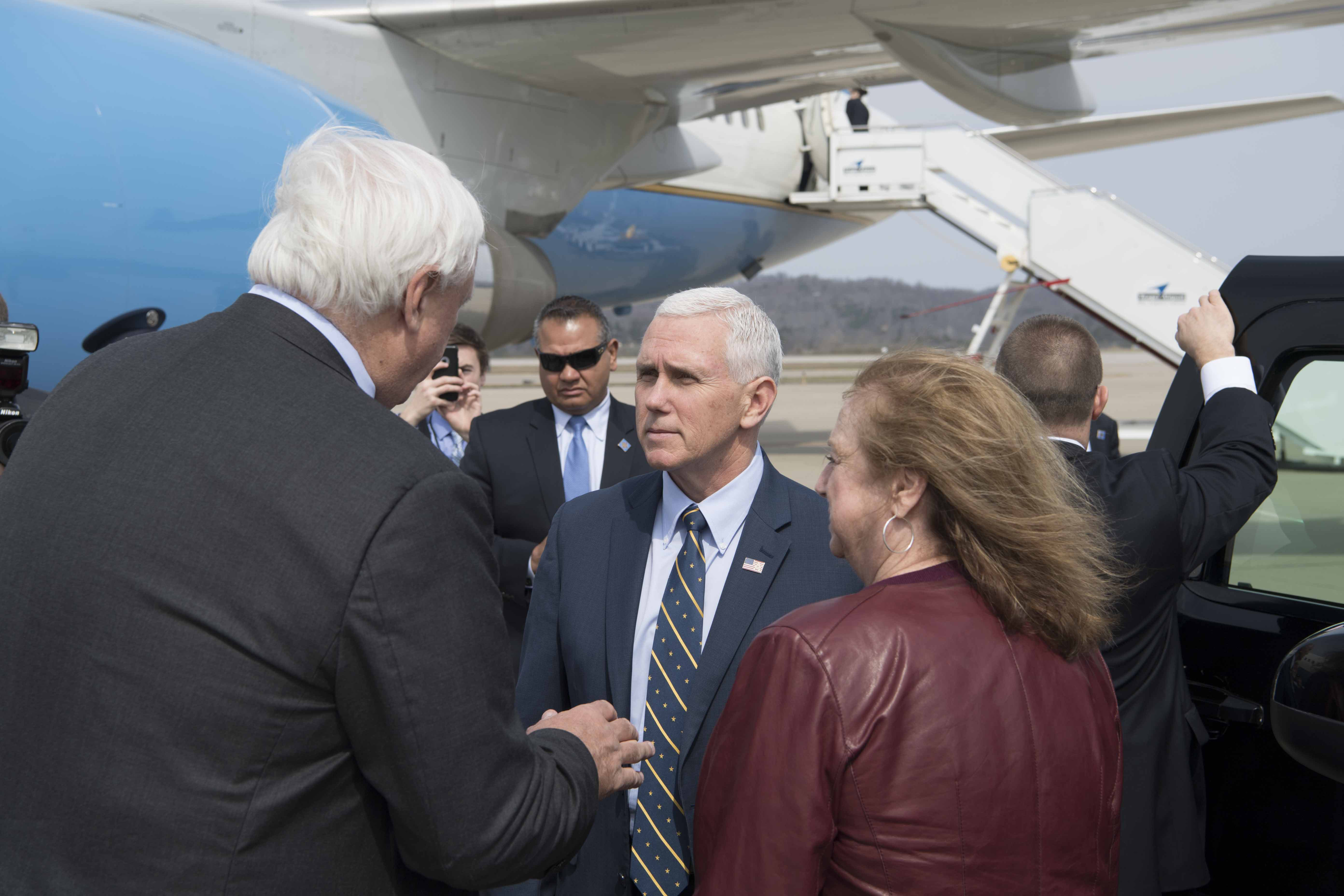
Justice took office as governor on January 16, 2017. He quickly became known for his characteristic communication style, often employing colorful metaphors and sharp criticisms against political opponents, referring to them as "knuckleheads" or comparing himself to a "grizzly" and a Senate majority leader to a "poodle."
To address West Virginia's budget challenges, Justice proposed increasing state revenue by 450.00 M USD. His proposals primarily involved increasing the consumer sales tax, reinstituting the business and occupation (B&O) tax, and establishing a "rich man's" tax. He also publicly opposed plans to cut spending on health and education. In a highly publicized event on April 13, 2017, while vetoing a budget bill passed by the Republican-controlled West Virginia Legislature, Justice famously declared the bill "nothing more than a bunch of political you-know-what," illustrating his point with a prop featuring cow manure placed on a printed copy of the bill.
A pivotal moment in his governorship occurred on August 3, 2017, when Justice announced at a rally with President Donald Trump in Huntington that he was rejoining the Republican Party. He stated that he could not support Trump as a Democrat, and his decision surprised even his own staff. This move made Justice the first Republican governor of West Virginia since Cecil Underwood in 2001. After his party switch, Justice initially supported incumbent Democrat Joe Manchin for re-election in the 2018 Senate election. However, he later endorsed Republican Senate candidate Patrick Morrisey in the general election. Despite his later support for Morrisey, Justice expressed no plans to run against Manchin in February 2021, stating his desire to "do good stuff for West Virginia" before "fading off into the sunset."
In 2020, Justice signed the Critical Infrastructure Protection Act into law. This legislation created felony penalties for protests targeting oil and gas facilities. The law, which received support from industry groups such as Dominion Energy, the West Virginia Oil and Natural Gas Association, and the American Fuel and Petrochemical Manufacturers trade association, was explicitly requested by the natural gas industry, according to its sponsor. This act drew criticism from civil liberties and environmental groups who viewed it as a measure to suppress dissent against the fossil fuel industry.
3.2. U.S. Senator
Following his two terms as governor, Jim Justice successfully pursued a seat in the United States Senate, further solidifying his position in national politics.
3.2.1. Senate Elections
In April 2023, Justice announced his candidacy for the 2024 United States Senate election in West Virginia. This highly anticipated race saw him challenge incumbent Democrat Joe Manchin, who later announced his retirement, leaving the seat open. Justice secured the Republican nomination on May 14, 2024, defeating U.S. Representative Alex Mooney with 61% of the vote. In the general election held on November 5, he triumphed over the Democratic nominee, former Wheeling mayor Glenn Elliott, becoming the first Republican to win that specific Senate seat since 1956.
3.2.2. Senate Tenure and Committee Assignments
Justice chose to complete his gubernatorial term, which ended on January 13, 2025, before joining the Senate, effectively reducing his Senate term by 10 days. He was sworn into office on January 14, 2025, by Senate President pro tempore Chuck Grassley. Justice missed the first roll-call vote of his Senate tenure, on an amendment to the Laken Riley Act.
His early actions in the Senate have reflected his established political leanings. In January 2025, when President Donald Trump announced across-the-board tariffs on Canada, Mexico, and China, Justice voiced his approval, dismissing concerns about potential negative impacts by stating, "Everybody runs through the streets saying, 'The sky is falling! The sky is falling!', but it doesn't fall."
For the 119th Congress, Justice has been assigned to several key committees:
- Committee on Agriculture, Nutrition, and Forestry
- Subcommittee on Conservation, Climate, Forestry, and Natural Resources
- Subcommittee on Food and Nutrition, Specialty Crops, Organics, and Research
- Subcommittee on Livestock, Dairy, Poultry, Local Food Systems, and Food Safety and Security
- Committee on Energy and Natural Resources
- Subcommittee on Energy
- Subcommittee on Public Lands, Forests, and Mining
- Subcommittee on Water and Power
- Committee on Small Business and Entrepreneurship
- Special Committee on Aging
4. Political Positions
Jim Justice's political ideology has evolved throughout his career, initially identifying as a conservative Democrat and later shifting to a more moderate or liberal Republican stance after rejoining the Republican Party in 2017. He contributed 200.00 K USD to Donald Trump's 2020 re-election campaign. His political positions, particularly on economic, social, environmental, and vaccination policies, reflect a complex blend of traditional party stances and pragmatic approaches.
4.1. Economic Policy
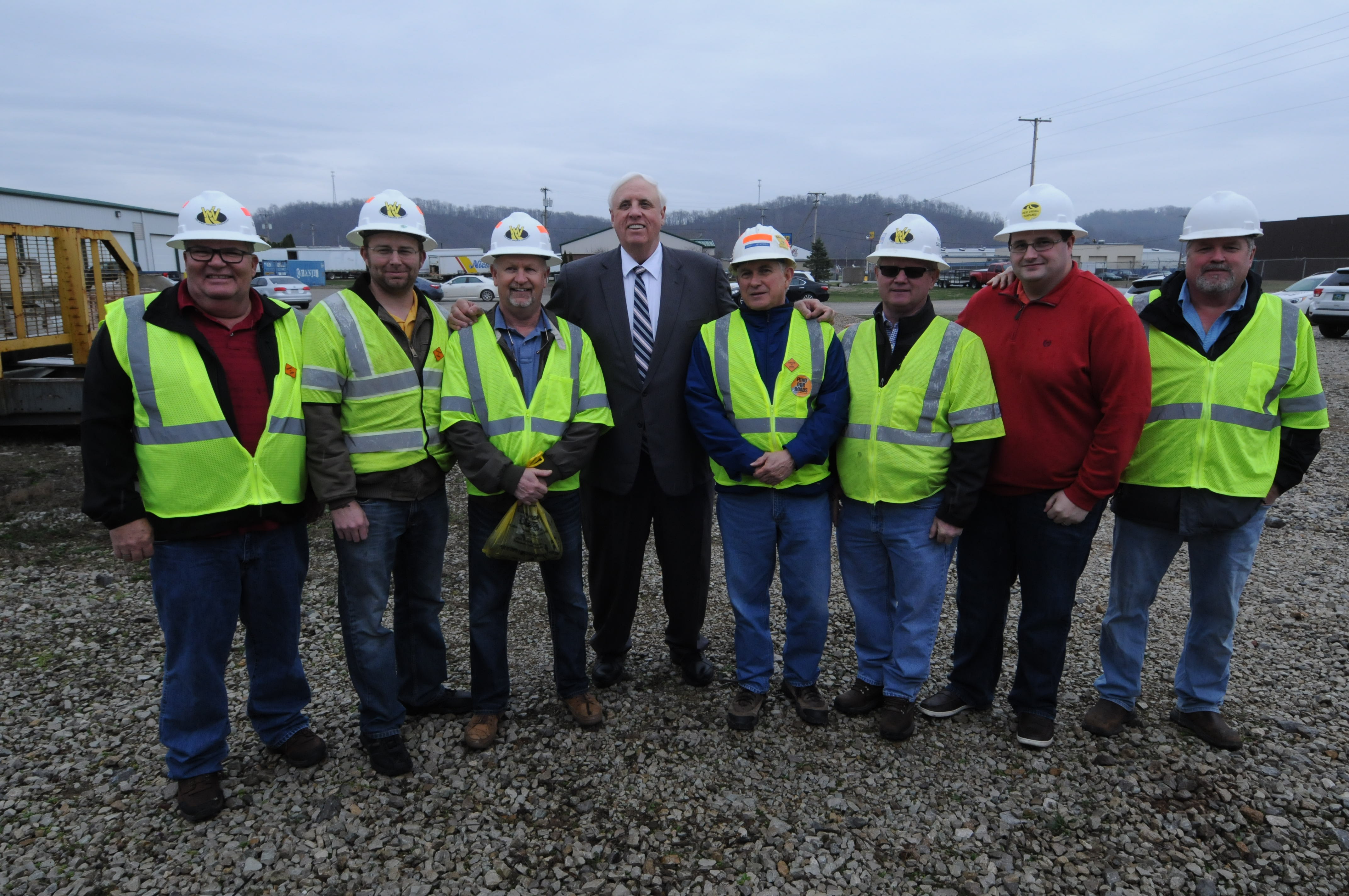
Justice has consistently advocated for the coal industry, a critical sector in West Virginia, throughout his gubernatorial campaigns and tenure. On taxation, he has generally opposed raising taxes but has supported increasing teachers' salaries, arguing that increased state revenue would cover the additional budget spending. The libertarian Cato Institute gave Justice an "F" grade for his fiscal policies, a rating he publicly disagreed with. Before his party switch, Senate President Mitch Carmichael noted that while Justice held philosophies aligned with Republicans, he deviated on "tax-and-spend policies."
In February 2021, Justice urged Senator Joe Manchin to support President Joe Biden's 1.90 T USD stimulus package, cautioning against being "fiscally responsible" and emphasizing the severe economic hardship faced by many, stating, "I mean, we got people that are really hurting." Regarding proposals to raise the federal minimum wage to $15 an hour, Justice expressed a nuanced view, acknowledging the difficulty of living on lower wages while also voicing concern that too high a minimum wage could lead to job losses.
4.2. Social Policy
Justice's stances on social issues have largely aligned with conservative principles, though with some notable complexities or shifts over time.
On **abortion**, Justice has stated he does not support abortion, though he initially acknowledged the Supreme Court's decision on the issue as settled law. However, he later attended a rally supporting Amendment 1, a state constitutional amendment designed to ban abortion if Roe v. Wade were overturned. In September 2022, after Roe v. Wade was indeed overturned, Justice signed into law a bill imposing a near-total ban on abortion at any stage of pregnancy, with limited exceptions for medical emergencies and cases of rape or incest. He has publicly affirmed his position as "rock solid for life" as governor.
Regarding **gun control**, Justice is a proponent of gun ownership and favors limited gun regulations. In 2018, he signed a bill, supported by the National Rifle Association of America (NRA), allowing gun owners to keep their firearms locked in vehicles on employer property. He also approved legislation legalizing hunting on Sundays on private land. In March 2023, Justice signed a bill legalizing campus carry for individuals with concealed carry permits.
On **healthcare**, Justice supports West Virginia's Medicaid expansion, which was implemented by the previous administration under the Affordable Care Act. He opposed the American Health Care Act, a Republican-backed House bill to repeal the Affordable Care Act, arguing that its passage would "cripple [West Virginia] beyond belief."
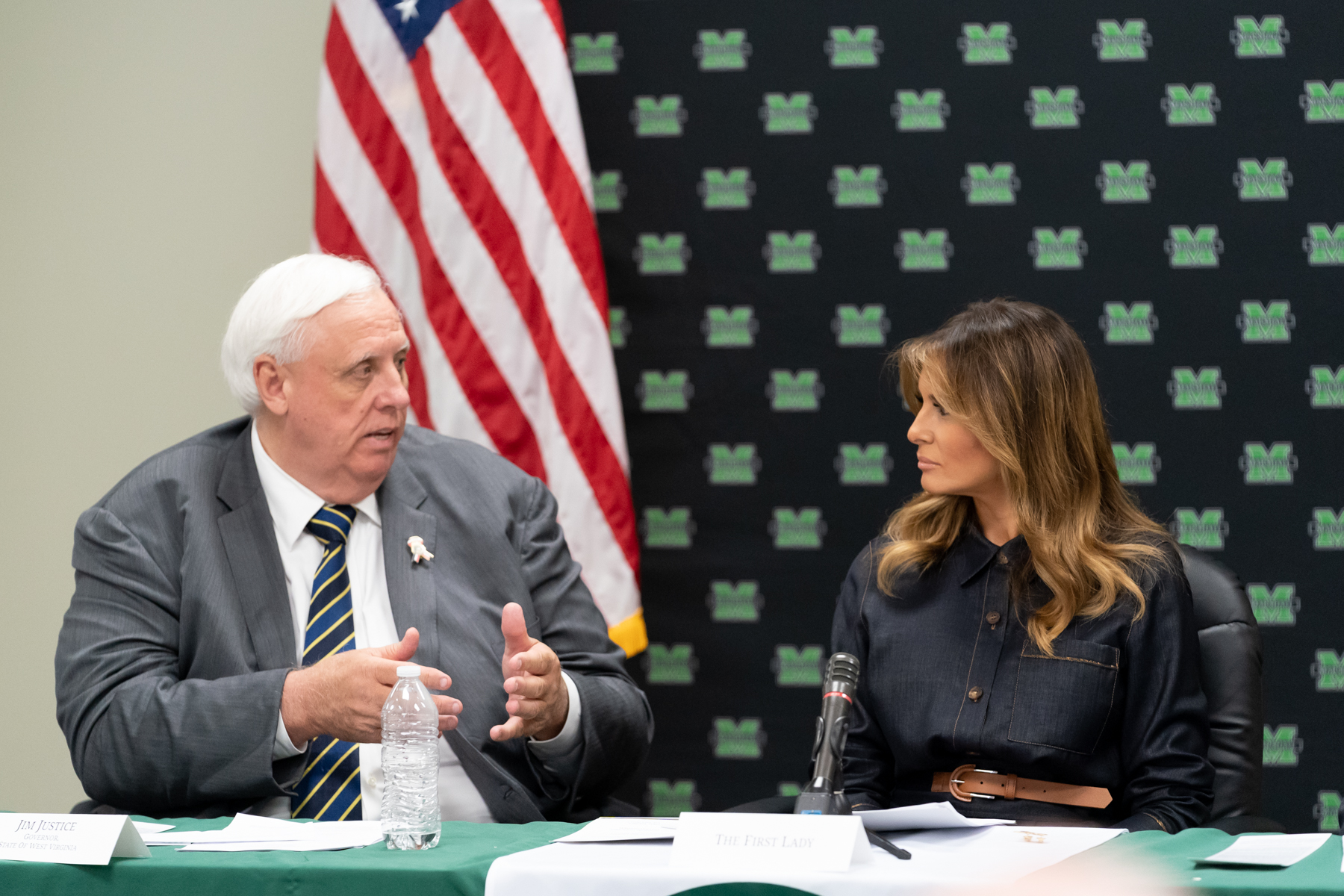
Justice's position on **LGBTQ+ rights** has shown a degree of evolution and sometimes conflicting stances. He has stated his respect for the Supreme Court's decision in Obergefell v. Hodges, which legalized same-sex marriage nationwide, considering it settled law. In 2017, he opposed a bill that would have allowed businesses to refuse service to LGBTQ+ customers. However, in 2023, Justice signed legislation prohibiting gender-affirming care for minors. He has also "proudly" signed a 2021 law prohibiting transgender athletes from competing in West Virginia. In 2024, when questioned about signing the Fairness Act, legislation that would prohibit discrimination based on sexual orientation and gender identity in employment and customer service industries, Justice said he would need to review the bill. While he welcomed LGBTQ+ individuals to "come to West Virginia" and participate in its economy, this response was more cautious than his previous support for similar anti-discrimination legislation in 2020.
4.3. Environmental Policy
Justice's views on environmental policy, particularly regarding climate change and energy, reflect a pragmatic approach that balances traditional industry support with a cautious openness to new energy sources. According to the Charleston Gazette-Mail, Justice has equivocated on the scientific consensus on global warming. In a 2016 interview, he stated that while "documentation would give one concern" and should not be ignored, "an awful lot of research that still should be done." He refrained from explicitly stating belief or disbelief in global warming, expressing general concern instead.
At the beginning of his second term as governor, Justice acknowledged himself as a believer in alternative energy. He pointed to the construction of a new wind farm by Clearway Energy Group, which is expected to increase state wind power by 15%. However, he maintained a strong stance that the nation cannot currently function without reliance on fossil fuels like coal and gas, stating, "There will be a day we transition away from fossil fuels. But I frankly don't believe that it is now."
4.4. Vaccination Policy
During the COVID-19 pandemic, West Virginia initially performed well in vaccine distribution, ranking second only to Alaska in early stages. However, the state later lagged behind much of the nation in vaccination rates. Justice actively encouraged West Virginians to get vaccinated, famously promoting the slogan "Do It for Babydog", referring to his pet bulldog.
Justice occasionally expressed frustration with the state's Republican-majority legislature, deeming some of their stances "too extreme." In 2024, he vetoed a bill that aimed to curb vaccination requirements for nontraditional public school students. He maintained a pro-vaccine stance during the pandemic, emphasizing his reliance on licensed medical professionals, who "overwhelmingly" opposed such legislation.
5. Personal Life and Other Activities
Beyond his political and business careers, Jim Justice is deeply involved in his family and various personal pursuits, particularly in sports and philanthropy.
5.1. Family and Residence
Justice met his wife, Cathy Justice (née Comer), in high school. They married in 1975 and have two children, Jill and Jay. The family are members of the First Baptist Church in Beckley, a congregation of the American Baptist Churches USA. Justice stands at 6 in tall.
Justice lives in Lewisburg, West Virginia. During his governorship, he faced a lawsuit regarding his residency, filed by former state house assistant minority whip Isaac Sponaugle. The lawsuit argued that Justice did not reside in the West Virginia Governor's Mansion in Charleston, despite the state constitution requiring the governor to "reside at the seat of government." The case reached the West Virginia State Supreme Court, which denied a motion for a writ of prohibition, with Chief Justice Evan Jenkins defining "reside" in terms of statewide officeholders. In March 2021, Justice resolved the lawsuit, agreeing to reside in Charleston and covering Sponaugle's legal fees.
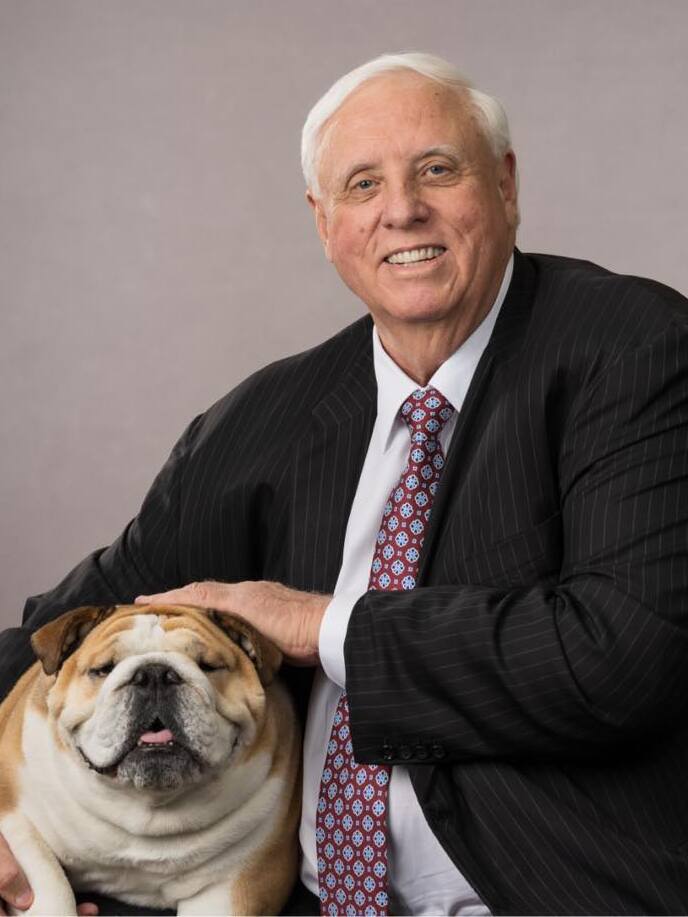
A distinctive feature of Justice's public image is his female English bulldog, Babydog, who frequently accompanies him at public engagements, including the 2024 Republican National Convention.
5.2. Sports and Hobbies
Justice is a lifelong fan of the New Orleans Saints of the National Football League. In 2014, he invested 30.00 M USD to develop a training camp for the team at The Greenbrier. Until 2019, he also hosted the Greenbrier Classic, a PGA Tour event, annually at the resort.
He has been deeply involved in youth sports, serving as the president of Beckley Little League since 1992, an organization he helped expand to include over 1,000 children playing on 80 baseball teams. Justice also has a long history as a high school basketball coach. He coached the girls' basketball team at Greenbrier East High School in Fairlea, West Virginia, since 2003, leading them to a state championship in 2012. In 2011, he also took on the role of head coach for the boys' basketball teams, a position he held until 2017. He was the only coach at the AAA level (the state's largest classification) to coach both the girls' and boys' basketball teams. Despite his demanding roles in business and politics, Justice has maintained his commitment to coaching, expressing his intention to continue coaching even after his election to the U.S. Senate.
5.3. Philanthropy
Justice is known for his significant philanthropic contributions. He donated 25.00 M USD to the James C. Justice National Scout Camp at Summit Bechtel Reserve, 5.00 M USD to Marshall University, and 10.00 M USD to the Cleveland Clinic. Additionally, he facilitates the distribution of over 1.00 M USD worth of Christmas gifts annually through his "Dream Tree for Kids" program.
6. Electoral History
| Election | Office | Party | Vote Percentage | Votes | Result |
|---|---|---|---|---|---|
| 2016 West Virginia Democratic gubernatorial primary | Governor of West Virginia | Democratic Party | 51.37% | 132,704 | Won |
| 2016 West Virginia gubernatorial election | Governor of West Virginia | Democratic Party | 49.09% | 350,408 | Won |
| 2020 West Virginia Republican gubernatorial primary | Governor of West Virginia | Republican Party | 63.0% | 127,445 | Won |
| 2020 West Virginia gubernatorial election | Governor of West Virginia | Republican Party | 63.49% | 497,944 | Won |
| 2024 West Virginia Republican U.S. Senate primary | U.S. Senator (Class 1) | Republican Party | 61.84% | 138,307 | Won |
| 2024 United States Senate election in West Virginia | U.S. Senator (Class 1) | Republican Party | 68.75% | 514,079 | Won |
7. Legacy and Reception
Jim Justice's legacy is characterized by his unique blend of business acumen, political opportunism, and a deeply ingrained connection to West Virginia. His career reflects the complexities of the state's economic and social landscape, particularly its reliance on the coal industry and its conservative political leanings.
On one hand, Justice is lauded for his business successes, including preventing the bankruptcy of The Greenbrier resort and his efforts to reopen coal mines, which provided much-needed employment in struggling communities. His extensive philanthropic contributions, particularly to youth sports and major institutions, highlight a commitment to community welfare. Supporters often point to his direct and sometimes folksy communication style as a sign of authenticity and a willingness to fight for West Virginia's interests. His decisive re-election as governor, despite changing parties, suggests a strong personal appeal to voters.
However, Justice's career is also marked by significant controversies and criticisms. His business practices have drawn severe scrutiny, with allegations of widespread unpaid taxes, mine safety violations, and numerous lawsuits over unpaid bills. Reports of his companies receiving substantial federal aid during the COVID-19 pandemic while facing large outstanding debts and not guaranteeing job retention raised questions about accountability and the ethical implications of public office. His highly visible party switch from Democrat to Republican, occurring less than a year into his first term, has been viewed by some as an opportunistic move driven by political expediency rather than consistent ideological conviction. Critics have also pointed to his equivocal stance on climate change and his support for legislation like the Critical Infrastructure Protection Act as prioritizing industry interests over environmental protection and civil liberties. His complex and sometimes contradictory positions on social issues, particularly LGBTQ+ rights and abortion, illustrate a political flexibility that can be perceived as inconsistent. Overall, Jim Justice leaves a multifaceted legacy as a powerful, yet controversial, figure who has undeniably shaped West Virginia's recent history.
8. External links
- [https://justice.senate.gov Senator Jim Justice official U.S. Senate website]
- [https://jimjusticewv.com/ Jim Justice for Senate campaign website]
- [https://governor.wv.gov/ Governor of West Virginia official government website]
- [http://www.wvencyclopedia.org/articles/2350 "Jim Justice" article in The West Virginia Encyclopedia]
- [http://politicselections.com/poll-jim-justice-losing-favor-among-republicans/ Poll Numbers on Jim Justice]
- [https://www.c-span.org/person/?105143 Jim Justice on C-SPAN]
- [https://twitter.com/WVGovernor Jim Justice on X (formerly Twitter)]
- [https://www.facebook.com/WVGovernor Jim Justice on Facebook]